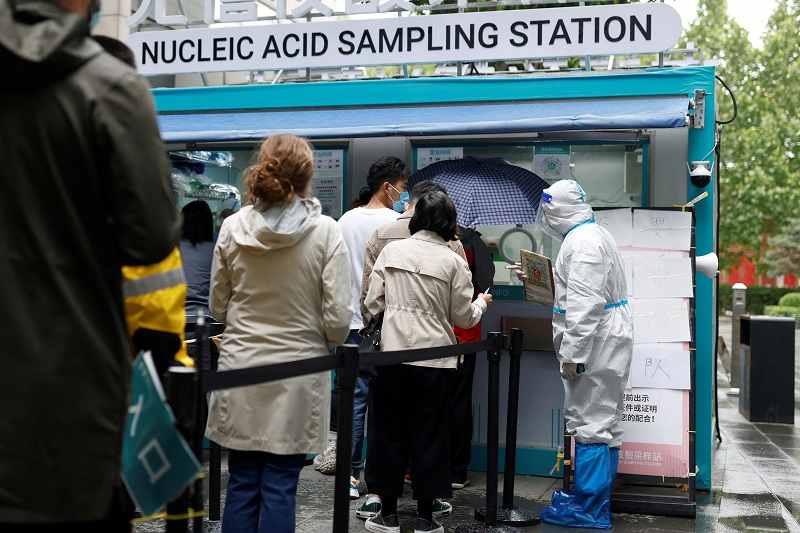
People line up to get tested next to a staff member wearing personal protective equipment (PPE) at a mobile nucleic acid testing site outside a shopping mall, amid the coronavirus disease (COVID-19) outbreak in Beijing, China May 6, 2022.
14:30 JST, May 8, 2022
BEIJING/SHANGHAI (Reuters) – Millions of Beijing residents queued up for another round of COVID-19 tests on Sunday as China’s capital seeks to trace and isolate every infection to contain a small but stubborn outbreak – and avoid a Shanghai-type prolonged lockdown.
Strict COVID curbs in Beijing, Shanghai and dozens of other major cities across China are taking a psychological toll on its people, weighing on the world’s second-largest economy and disrupting global supply chains and international trade.
But Chinese authorities are unwavering in their commitment to stamp out the coronavirus, rather than live with COVID like many countries that are easing or ditching virus measures. Last week the authorities threatened action against critics of the zero-COVID policy.
Most of the 25 million people in the commercial hub of Shanghai, China’s most populous city, had been confined to their housing compounds for more than a month. Many complain of not being able to get food or to access emergency healthcare or other basic services.
Parts of Shanghai have seen their risk levels officially downgraded to the point where government rules would in theory allow them to leave their residences.
But while some were allowed out for brief walks or grocery trips, most were still stuck behind the locked gates of their compounds, causing widespread frustration and occasionally leading to rare altercations with hazmat-suited authorities.
Beijing was desperate to avoid such drama, relentlessly working to track and isolate infections.
On Sunday, residents lined up for another round of tests in the Chaoyang, Fangshan and Fengtai districts and small parts of others where infections had been detected over the past two weeks.
It has become an almost daily routine in the capital. Even if they are not subject to the mass tests, many still need to show a recent negative result to get to work or enter various venues.
HEALTH APP ‘ABNORMALITIES’
Beijing has closed gyms and entertainment venues, banned dine-in services at restaurants and shut scores of bus routes and almost 15% of its sprawling subway system.
The streets were less hectic than usual, with many not wanting to risk any activity that could classify them as close contacts of COVID patients, forcing them into quarantine. Businesses that remained open were suffering.
A barber who asked to be identified only by his surname Song said his salon at a high-end shopping mall in Chaoyang has seen far fewer clients since the outbreak.
“They’re afraid of getting abnormalities in their health apps,” Song said, referring to the mobile monitoring software all residents must use. “North of us are malls and offices that have been sealed, and their apps might mark them as close contacts if they came.”
Song said his salon will try to stay open for as long as possible, but he was not sure for how long. “This outbreak has truly unsettled everyone.”
Beijing’s daily COVID cases are in the dozens, much lower than Shanghai’s at this point in its own outbreak, when infections were in the triple digits and rising.
Shanghai’s cases fell for a ninth day, Sunday data showed, but remained in the thousands.
Like other cities in China, Shanghai is building thousands of permanent PCR testing stations. With most residents still indoors, this seems to anticipate a gradual return to normal life when people are back out on the streets.
But authorities have warned that remains far off.
Top Chinese leaders meeting last week said the nation would fight any comment or action that distorted, doubted or repudiated its COVID policy. Shanghai party and city officials have also warned against complacency.
Top Articles in News Services
-

Prudential Life Expected to Face Inspection over Fraud
-

Hong Kong Ex-Publisher Jimmy Lai’s Sentence Raises International Outcry as China Defends It
-

Japan’s Nikkei Stock Average Touches 58,000 as Yen, Jgbs Rally on Election Fallout (UPDATE 1)
-

Trump Names Former Federal Reserve Governor Warsh as the Next Fed Chair, Replacing Powell
-

Suzuki Overtakes Nissan as Japan’s Third‑Largest Automaker in 2025
JN ACCESS RANKING
-

Japan Institute to Use Domestic Commercial Optical Lattice Clock to Set Japan Standard Time
-

Israeli Ambassador to Japan Speaks about Japan’s Role in the Reconstruction of Gaza
-

Man Infected with Measles May Have Come in Contact with Many People in Tokyo, Went to Store, Restaurant Around When Symptoms Emerged
-

Prudential Life Insurance Plans to Fully Compensate for Damages Caused by Fraudulent Actions Without Waiting for Third-Party Committee Review
-

Woman with Measles Visited Hospital in Tokyo Multiple Times Before Being Diagnosed with Disease





















